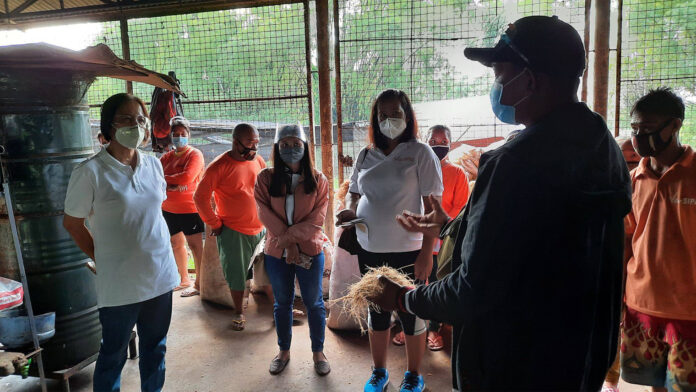Villar SIPAG has four farm schools established one after the other since 2015. The first is located in the boundary of Las Pinas City and Bacoor city that cater to farmers in NCR, Southern Luzon, and Bicol. The farm in San Jose del Monte City opened in July 2016.. It also offers free training programs for farmers in Northern and Central Luzon and the Cordilleras. Both Villar SIPAG farms schools are venues of the training program on Agri-Crops production in partnership with East West Seeds Foundation- program that is open to everyone who wants to learn urban agriculture, Training on Farm Business School, Production of High Quality Inbred Rice Seeds and Farm Mechanization, Workshop on Farm Machinery Operation, Management and Enterprise and Training on the Operation and Maintenance of Rice Machinery. All these in partnerships with Agricultural Training Institute (ATI), Philmech, Philrice and TESDA. It also provides location for training on Freshwater Aquaculture and Training on Native Animal Production and Management together with Bureau of Fisheries and Aquatic Resources (BFAR) and Bureau of Animal Industry (BAI). It also holds training in cacao production, intercropping of coconut with the Philippine Coconut Authority (PCA).
On January 20, 2020, Villar inaugurated the Villar SIPAG Farm School in San Miguel, Iloilo to serve the Visayas Region. The main training program offered here is the two-week Training of Trainors on Rice Mechanization and Inbred Rice Seeds Production. The Philippine Carabao Center also conducts training in Villar SIpag Farm such as Training on Bull handling and Dairy and Bufallo Fattening. It became a venue for TESDA courses like Construction, Painting and Masonry.
In addition, the Villar SIPAG Farm School in Davao City was established also in 2020 to provide training to farmers and others who want to avail of agriculture-related training in Mindanao.
Trainings at the Villar Farm Schools are financed by the Villar Social Institute for Poverty Alleviation and Governance (SIPAG). The Villar SIPAG Farm Schools have welcomed thousands of trainees and hosted hundreds of training sessions on agriculture-related courses for free.
To date, there are 2,367 accredited farm schools all over the country that serve as learning sites for farmers and plant enthusiasts who are given the opportunity to train for free on the ways of modern farming. The farm schools once accredited with the Technical Education and Skills Development Authority (TESDA) or by the Agricultural Training Institute (ATI) they can avail of government support and scholarship grants as a learning site.
The chairperson of the Committee on Agriculture and Food promote the increase of farm schools nationwide for agriculture-related training to help remove the barriers that prevent Filipino farmers and fisher folk from being competitive and profitable, including the lack of technology, mechanization and financial literacy, how to operate the farm as a business and inability to access cheap credit.
The growth of farm schools all over the country was attributed to two pieces of legislation that Senator Villar principally authored: Republic Act 10816 or the Farm Tourism Development Act of 2016, which encourages the conversion of farms into tourist farms and learning sites; and Republic Act 11203 or the law that created the P10-billion Rice Competitiveness Enhancement Fund which mandated a special role for farm schools as venues of extension services program.
Photo Source: Facebook/Villar SIPAG


